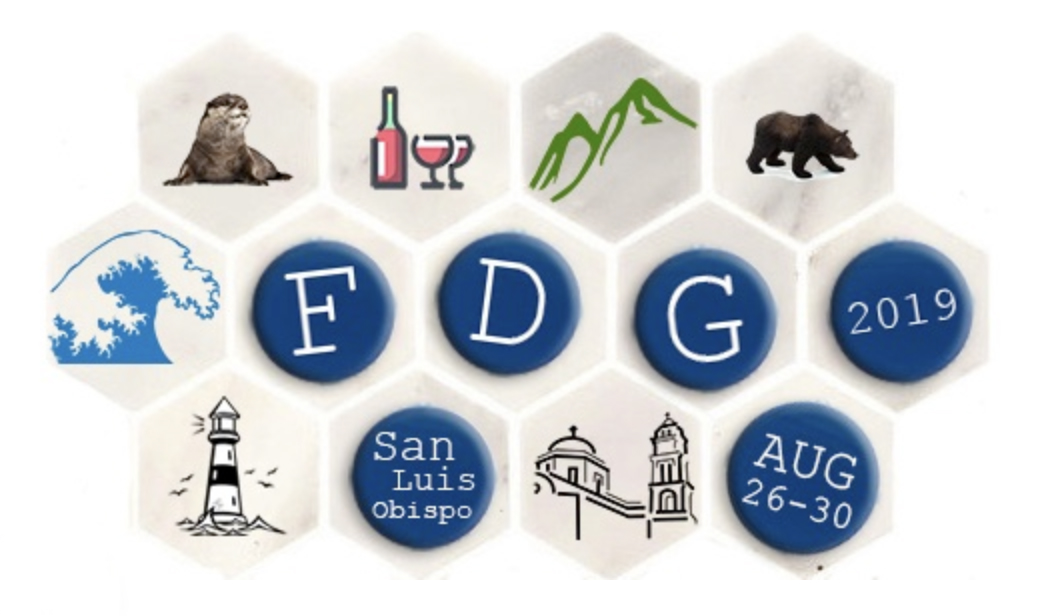Each year, hundreds of students, professionals, and researchers in the gaming industry submit their papers for review to the Foundations of Digital Games Conference (FDG). The international conference, hosted this year in San Luis Obispo at California Polytechnic University in August, seeks to explore current research related to digital games. Originally created by Kent Foster and John Nordlinger of Microsoft, the conference is dedicated to studying game development in relationship to education. Since its founding, the event has expanded and now covers a spectrum of digital game design topics and has been held in locations all over the world. CAMD will be well represented at the 2019 conference with several students’ and scholars’ papers conditionally accepted to be presented.

Xena Jiang was a Northeastern visiting scholar who studies Game Science and Design during her time in Boston. Her paper, titled The Computational Puzzle Design Framework: A Design Guide for Games Teaching Computational Thinking, was one that was accepted for FDG. Computational Thinking (CT) skills have been recognized as important abilities for children to learn in a computer and technology driven era. The gaming industry has been striving to create games that can assist in building CT skills in developing children.
“This paper presents a design framework that describes the building blocks for developing (noncoding) gameplay elements in games teaching CT,” Xena explained. “The framework focuses specifically on computational problem-solving by illustrating the design framework through LittleWorld, a mobile game that teaches CT concepts through insects.”
Xena is excited to have her paper acknowledged by the international scholars in the game research field who participate in the Foundations of Digital Games Conference. She is proud of herself, a non-native English writer, for mastering this academic endeavor. She credits much of her success to CAMD Professor Casper Harteveld for mentoring her in writing this paper and encouraging her to pursue her passion of researching game design and Computational Thinking.

Borna Fatehi earned his Master’s Degree in Game Science and Design at Northeastern in 2017, where he found himself enthusiastic about the intersection of games and psychology. He took an interest in how games can be beneficial in the both psychological domain and studying human cognition. His FDG-accepted paper is entitled Gamifying Psychological Assessment: Insights From Gamifying the Thematic Apperception Test (TAT). As the title suggests, Borna researches the gamification of TAT, a robust psychological test, in this research.
“I made a narrative game incorporating TAT, ran a study where participants did both the standard and game version of TAT, and then argued why it is beneficial to utilize gamification in the psychology domain,” he explained.
Borna believes that by integrating psychological examinations into gaming frameworks, more about the both the player’s conscious and subconscious mind will be revealed, allowing for more effective therapy treatments.
He’s eager to attend this conference and feels it will be a great way to meet new professionals in the gaming community.
“This is my first paper as the leading author and I learned a lot while working on this paper,” he said. “Arguably, this experience provided me with substantial insights that I could not achieve by just pursuing my Master’s degree program. I encourage anyone who is participating in a higher degree program to experience publishing an academic paper as the leading author,” Borna concluded.

Guillermo Romera Rodriguez, John Hart, and Tyler Corwin are all students in Northeastern’s Game Science and Design Graduate Program who also had their paper accepted to the conference. Together, they worked with CAMD Postdoctoral Researcher Sam Snodgrass to write Like PEAS in PoDS: The Player-Environment-Agents-System Framework for the Personalization of Digital Systems, a paper that explored how game environments, artificial intelligence, and the goals and rules of a game can be modified and presented differently to players.
“Specifically, the paper presents a framework for the personalization of digital systems,” Guillermo explained. “However, the approach we have followed is by using a tetrad; focusing our framework exclusively on four main aspects – the players, the environment, the agents and the system.”

“We informed the development of our framework with an extensive review of the existing personalization, player modeling, and game design literature,” Sam Snodgrass elaborated. “This review showed us what type of adaptation and personalization has been done in the past, how those adaptations have been applied to different players, and finally, many different ways of discussing and describing the components of a game. We believe that our proposed framework will help guide future personalization and adaptation approaches, and allow new approaches to employ a more theoretically grounded approach,” he concluded.
Guillermo is excited to have this paper accepted to the FDG conference, especially as he begins to consider pursuing his Ph.D. He believes this will be a fantastic opportunity to start making a name for himself in the Game Design and Science industry.
Dr. Snodgrass, who has presented at several conferences in the past, was also looking forward to adding this to his repertoire.
“They are great venues for getting thoughtful feedback directly from the people who could be using your work in the future, or whose research your own work is built from,” Dr. Snodgrass said on the topic of speaking at conferences. “I am most excited to see how the games research community reacts to our proposed framework, and to discuss our research with others in the field. Also, this year FDG is having a puppy welcoming committee, so that is obviously a big benefit.”
Congratulations to all of the students and scholars whose work was accepted by the 2019 FDG Conference!


